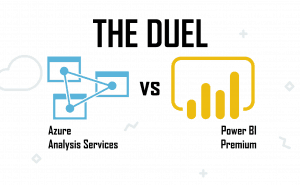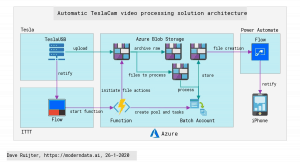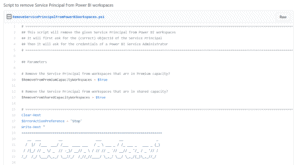It’s one of the questions I get asked most often these days. Besides “Which data flow solution are you talking about?” 
“What is the difference between Power BI Premium and Azure Analysis Services, and how do I select the service that fits my needs best?”
Update 9-12-2019: Richard Tkachuk has published an excellent post on the Power BI blog comparing Power BI Premium and Analysis Services. I highly recommend reading it:
https://powerbi.microsoft.com/en-us/blog/power-bi-premium-and-azure-analysis-services/
Microsoft has made it clear that they see Power BI Premium as their primary enterprise BI platform, and is rapidly releasing features to accelerate enterprise adoption. The roadmap includes options like XMLA endpoints, shared and certified datasets, and improvements for paginated reports.
Okay Dave, enough said! Let’s go for Power BI Premium because it has it all, right? Right..?

Well… Unfortunately, it’s not always an easy choice. While Microsoft is working hard on converging Azure Analysis Services and Power BI Premium, there are currently still things Azure Analysis Services provides that Power BI Premium does not (yet). Furthermore, we must not forget the fundamental differences between these two services. Azure Analysis Services is a PaaS offering, and Power BI Premium is a SaaS offering.
Let me help you with your challenge, by providing a little tool that takes these things into consideration, and helps you select the service that suits your needs best!
The Absolute Guide
I’ve created a Power BI report to help you decide between Azure Analysis Services and Power BI Premium. You can use the embedded report below, or via this direct link.
Please open the report on a desktop or tablet, as it does not scale very well on mobile devices.
Please post your questions and feedback in the comments below, or send a message on Twitter!




Pingback: Last Week Reading (2019-03-17) | SQLPlayer
Your article states that we shouldn’t forget the fundamental difference between the two, PaaS vs. SaaS. But you don’t tell us why you think that matters. Why should we care?
You should care because it reflects on the skills and processes needed to manage the – in this case – data models in your organization. When leveraging PaaS, like Azure Analysis Services, a lot of stuff will be taken care of for you, but you still have to manage partition management, refresh schedules, etc. using some form of scripting or external tooling (and will probably need an extra component in your architecture to accomplish that, like Azure Automation / Logic Apps / Data Factory). If you can leverage more SaaS features, a bigger part of the (technical/background) management will be taken care for you. In the end, this means that the skills required for the people involved that manage, create and use the data models are different and in general less infrastructure/technical-operations oriented. This allows your environment and implementation to scale better, as the business is able to do more themselves. And this will free up time for the IT crew to focus on managing the PaaS components in your data architecture.
Looking forward to your reaction, if this clarifies what I meant with that comment in my blog!